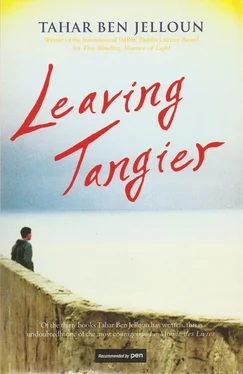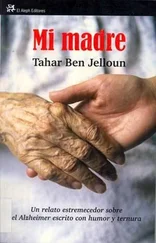Tahar Ben Jelloun - Leaving Tangier
Здесь есть возможность читать онлайн «Tahar Ben Jelloun - Leaving Tangier» весь текст электронной книги совершенно бесплатно (целиком полную версию без сокращений). В некоторых случаях можно слушать аудио, скачать через торрент в формате fb2 и присутствует краткое содержание. Год выпуска: 2009, Издательство: Arcadia Books, Жанр: Современная проза, на английском языке. Описание произведения, (предисловие) а так же отзывы посетителей доступны на портале библиотеки ЛибКат.
- Название:Leaving Tangier
- Автор:
- Издательство:Arcadia Books
- Жанр:
- Год:2009
- ISBN:нет данных
- Рейтинг книги:5 / 5. Голосов: 1
-
Избранное:Добавить в избранное
- Отзывы:
-
Ваша оценка:
- 100
- 1
- 2
- 3
- 4
- 5
Leaving Tangier: краткое содержание, описание и аннотация
Предлагаем к чтению аннотацию, описание, краткое содержание или предисловие (зависит от того, что написал сам автор книги «Leaving Tangier»). Если вы не нашли необходимую информацию о книге — напишите в комментариях, мы постараемся отыскать её.
Leaving Tangier — читать онлайн бесплатно полную книгу (весь текст) целиком
Ниже представлен текст книги, разбитый по страницам. Система сохранения места последней прочитанной страницы, позволяет с удобством читать онлайн бесплатно книгу «Leaving Tangier», без необходимости каждый раз заново искать на чём Вы остановились. Поставьте закладку, и сможете в любой момент перейти на страницу, на которой закончили чтение.
Интервал:
Закладка:
June 26, 1951: I took the train to Tangier. At Arbaoua, the Guardia Civil were checking Moroccan passengers with particular interest, so I began a loud conversation in Spanish with Juan. The police saluted when they passed us; one of them even asked us for a cigarette. Juan let him keep the entire pack. Arriving ten hours later in Tangier, we were dazzled by the beauty of this city embraced by the sea. The peseta was the chief currency, and everyone spoke our language in this bustling international city, which was for us a place of disorienting and exhilarating freedom. We saw long, luxurious American cars, and I remember a pink Cadillac convertible driven by a very thin man, flashily dressed, beside whom sat a gorgeous European woman smoking a cigarette, just as in an advertisement. I later learned that the young man was the only son of an old Jewish family in Tangier, a very wealthy family. His name was Momy.
Within a week Juan found work in a large law firm with Spanish, French, and English employees. The Hôtel El Minzah was looking for a bookkeeper; while I worked there I met many people from the worlds of politics and literature. I remember in particular an American writer who was always drunk. Rumour had it that spies were everywhere; I never saw any, although there was one bartender who obviously worked with the police force — but which one? Each country had its own, so he must have sold information to anyone with money. I suspected that he was an informer because he began to criticize the Caudillo, trying to lead me in that direction — an obvious ploy, and when I told him I stayed away from politics, he took the hint. I spent eight most enjoyable months in that city. I adored the ‘Gran Socco’ with all those peasant women selling their plants, flowers, fruits, vegetables, and cow’s milk cheeses, and I also loved the other Socco, ‘el Socco Chico,’ where smokers quietly savoured pipes of kif, which wasn’t illegal — there were even blue signs with the map of Morocco outlined by the smoke of a cigarette, above which was written ‘Moroccan State Tobacco and Kif Authority.’ Yes, at the time there was no problem with smoking kif. I also liked the Old Mountain district with its colonial villas, formal receptions, its snobbish English girls and the beautiful Spanish women who served the guests. It was at one of those parties that Juan fell in love with Stéphanie, a French girl spending her vacation with her uncle, an interior decorator who did not like women. Juan and Stéphanie were married in France and as the saying goes, they lived happily ever after. I remember an English painter and his wife; he used to draw the medina, scenes of Moroccan life. And there was a member of the British royal family who loved parties and boys and didn’t care who knew it. At the time people also talked about an American writer who’d lived there for several years with an illiterate Moroccan boy, while his wife had set up house with a peasant woman. Tangier was like a circus full of those who live on the margins of society. I considered this spectacle with a critical eye and did not mix with such people.
February 13, 1952: I sailed away from there on a ship of the Paquet line, landing in Marseilles, where I was welcomed by friends in the Party who found me work at the Gare Saint-Charles. Those were difficult times. There were many Spanish refugees. One day I learned that my father had been taken to hospital, and I returned to Spain for the first time, travelling with forged papers. At home I was reunited with my wife, Mercedes, who had been working hard to raise our two children: fifteen-year-old Miguel, the rebel, and his twin Maria, an excellent student. Life proved stronger than my ideals; I did not become a turncoat, but I gradually distanced myself from the Party, especially after the Soviet invasion of Hungary.
I wanted to tell the story of that clandestine crossing in June 1951. Something historic, unique.
Miguel shut the notebook, rubbed his eyes, and looked at Kenza.
‘It’s incredible! Would you ever have believed that there were already illegal aliens in 1951, but going in the opposite direction from today’s boat people? That’s crazy, no? My father never spoke to me about this period in his life. Strange, isn’t it?’
Kenza didn’t know what to say. Like everyone else, she’d thought that Moroccans had invented those dangerous journeys.
‘You know, my dear, the Spaniards who occupied Morocco were desperately poor people, without the resources of the French. Franco drew the best elements of his army from the Rif, then lost interest in everything that might have helped the country to develop, to really exist. He never built anything decent over there, no dams, no roads; there was one Spanish hospital, but it was the nuns who actually ran the place. Well, what a time that was! That’s why Moroccans have never considered the Spanish as true colonizers. Some Spaniards, however, still feel superior to Moroccans, los moros , as they call them. Enough of that: how are you?’
Kenza wanted to talk about Nâzim’s proposal. Miguel’s pale face seemed very tired, though; perhaps he was ill. She decided to wait for a better occasion.
She was about to leave when he informed her that he’d asked his lawyer to begin divorce proceedings.
‘All you have to do is repudiate me,’ she replied. ‘You say three times, in front of witnesses, “I repudiate you” — and that’s it. Then you have a letter sent to me through the adoul s, who will inform me officially of your decision. That’s how it’s done in Morocco.’
Knowing that a Moroccan marriage was not a contract, but an act that had no legal value outside the Muslim sphere, Miguel had registered his marriage at the city hall in Barcelona, yet Kenza had never sought to take any advantage of her position. She gave Miguel a kiss.
‘You know, my Turkish friend, Nâzim … he wants to marry me.’
‘You’ll have children — I’ll be a father, or a grandfather!’
‘I haven’t gotten that far yet. I’m attracted to him, but I don’t know him very well. I can’t tell if he’s sincere. I feel something like a presentiment… Although, he is the first Turkish man I’ve ever met, and perhaps I’m prejudiced.’
‘Do you want me to make inquiries?’
‘No, no, don’t bother.’
‘Give me his name anyway, and the date when he arrived in Spain.’
‘He came here through clandestine channels, he’s an illegal.’
‘How can that be? If he hasn’t any papers, he won’t be able to get legally married.’
‘No, he’s suggesting that we get married and then apply to have his situation straightened out.’
‘As long as we haven’t been properly divorced, you won’t be able to remarry. As for him, if he wants to do things by the book, he has to clear up his own problems in any case. All this seems rather complicated to me.’
‘You’re right; it’s just something we were considering, we haven’t decided anything.’
‘Are you in love?’
‘Yes, Miguel.’
‘Don’t rush into this. Wait until your own position has been completely clarified. After that, you’ll do as you like. A Moroccan woman and a Turk! What a lovely mix, you’ll have handsome children!’
31 . Azel
AZEL WAS FAMILIAR with the Barrio Chino, the ‘Chinatown’ of Barcelona, so he knew it was no longer a Spanish neighbourhood. Below Las Ramblas, where Indian and Pakistani shopkeepers now plied their trades, the narrow streets looked sometimes like the medina of Fès, and sometimes like the older parts of Naples. There was nothing remarkable about the area. The walls were tired. The sad people and the few African women waiting around for clients in broad daylight were the dreariest part of the neighbourhood, a section of which had been taken over by the city for the construction of a film theatre and library. Moroccans hung around the area, killing time; some leaned back against a wall, sunbathing, while others sniffed the air. You would have thought they were waiting for the Prophet. They tended to gather at a phone store with the odd name of Al Intissar , ‘Victory,’ a narrow and rather inhospitable place on the Carrer de Sant Pau, squeezed in between a tiny hairdressing salon called Ma Sha’a Allah , ‘What God Willed,’ and a small house of prayer, Mezquita Tarik Bin Ziyad.
Читать дальшеИнтервал:
Закладка:
Похожие книги на «Leaving Tangier»
Представляем Вашему вниманию похожие книги на «Leaving Tangier» списком для выбора. Мы отобрали схожую по названию и смыслу литературу в надежде предоставить читателям больше вариантов отыскать новые, интересные, ещё непрочитанные произведения.
Обсуждение, отзывы о книге «Leaving Tangier» и просто собственные мнения читателей. Оставьте ваши комментарии, напишите, что Вы думаете о произведении, его смысле или главных героях. Укажите что конкретно понравилось, а что нет, и почему Вы так считаете.












